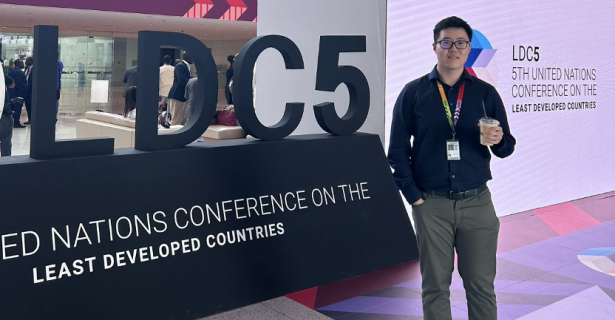It is the morning of the second conference day, and my mind is still echoing with UN Secretary-General Antonio Guterres’ call for a “new Bretton Woods moment” yesterday. During the Opening Ceremony, Guterres passionately spoke about the need to revolutionize the international financial system towards sustainable inclusion of the Least Developed Countries. Among a myriad of concurrent roundtables, forums, exhibitions, and events throughout the day (9am to 6:45pm, to be exact), I filled my schedule with sessions on the private sector’s role in implementing the Doha Program of Action (DPoA)—first on STI (Science, Tech, Innovation), then on agriculture and Public-Private Partnership, and lastly on Digital Connectivity. Among intermittent empty talks of some Heads of States, I feel especially excited to have gained useful insights from technocrat voices as well as business and industrial perspectives.
The highlight of the day came when the World Bank and Microsoft engaged in an inspiring public-private dialogue, outlining the potential for blended financing models to expand digital connectivity among the LDCs. Successful utilization of the internet requires four conditions: access to electricity, internet connectivity coverage, possession of material devices to connect, and basic digital skills among the population. Yet LDCs face shortages in all four elements. Particularly notable and prevalent is the “last-mile connectivity problem” that, even with a well-developed internet infrastructure extending across the nation, the last mile for the network to reach specific, dispersed users poses a huge difficulty, because such widescale construction generates a low return rate that goes counter to the incentive structure of private capital. Blended finance introduces public funding in crucial spots and offers various benefits to facilitate private sector cooperation in overcoming the last-mile connectivity problem. The discussion was convened in an informal style that permitted discussants to fully engage with the audience, who in turn brought years of practitioner’s experience worldwide to the table.
The conference provides an important learning experience for me, not in the sense of enriching factual knowledge but improving my general understanding of what international organizations do. To many, international organizations possess this image of being complex, bureaucratic, inefficient, and full of empty talks. I personally come from an environment that widely regards international organizations as ceremonial and subject to particular ideologies. Admittedly, these perceptions make some sense, especially during a conference when a myriad of problems get raised and solutions get brainstormed. But that’s certainly not the entire story. Let us not forget why we convene in Doha this week: the first part of UN LDC5 Conference in 2022 already announced the DPoA consisting of principles, commitments, and goals. This second part of LDC5 convenes for the purpose of turning the abstract DPoA into executable plans and concrete actions. In fact, some changes have been made—Qatar and Microsoft each announced their projects of action—while other projects remain on the way.
As a student in political philosophy, I usually like to question the meaning of international development projects—are these really the most efficient ways to help the people in LDCs? Or, to question the utility of this “LDC categorization”, is graduating from LDCs really an improvement for the 46 countries in the list? Arguments could certainly be made from the other side—newly graduated states might lose the generous international support and preferential policies ascribed to LDC status. There can hardly be an absolute answer to this question, but everyone should come to his/her/their own conclusion.
I would like to end the blogpost by extending my appreciation to Sage and Grace, without who Tufts would not have received accreditation to the Conference and we wouldn't have been able to come to Doha. As an international student and a graduating senior, I have spent my senior year organizing civic education projects to Chinese high school and college students. Throughout the year, I reflected on the following question: what is it that we frequently refer to as “civic spirit”? Although I still struggle to think of a well-rounded definition by far, I do find the efforts of Sage and Grace a perfect demonstration of such spirit.

